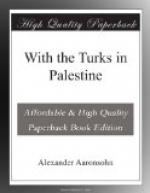Beersheba was swarming with troops. They filled the town and overflowed on to the sands outside, where a great tent-city grew up. And everywhere that the Turkish soldiers went, disorganization and inefficiency followed them. From all over the country the finest camels had been “requisitioned” and sent down to Beersheba until, at the time I was there, thousands and thousands of them were collected in the neighborhood. Through the laziness and stupidity of the Turkish commissariat officers, which no amount of German efficiency could counteract, no adequate provision was made for feeding them, and incredible numbers succumbed to starvation and neglect. Their great carcasses dotted the sand in all directions; it was only the wonderful antiseptic power of the Eastern sun that held pestilence in check.
The soldiers themselves suffered much hardship. The crowding in the tents was unspeakable; the water-supply was almost as inadequate as the medical service, which consisted chiefly of volunteer Red Crescent societies—among them a unit of twenty German nurses sent by the American College at Beirut. Medical supplies, such as they were, had been taken from the different mission hospitals and pharmacies of Palestine—these “requisitions” being made by officers who knew nothing of medical requirements and simply scooped together everything in sight. As a result, one of the army physicians told me that in Beersheba he had opened some medical chests consigned to him and found, to his horror, that they were full of microscopes and gynecological instruments—for the care of wounded soldiers in the desert!
Visits of British aeroplanes to Beersheba were common occurrences. Long before the machine itself could be seen, its whanging, resonant hum would come floating out of the blazing sky, seemingly from everywhere at once. Soldiers rushed from their tents, squinting up into the heavens until the speck was discovered, swimming slowly through the air; then followed wholesale firing at an impossible range until the officers forbade it. True to the policy of avoiding all unnecessary harm to the natives, these British aviators never dropped bombs on the town, but—what was more dangerous from the Turkish point of view—they would unload packages of pamphlets, printed in Arabic, informing the natives that they were being deceived; that the Allies were their only true friends; that the Germans were merely making use of them to further their own schemes, etc. These cleverly worded little tracts came showering down out of the sky, and at first they were eagerly picked up. The Turkish commanders, however, soon announced that any one found carrying them would pay the death penalty. After that, when the little bundles dropped near them, the natives would, run as if from high explosive bombs.
All things considered, it is wonderful that the Turkish demonstration against the Canal came as near to fulfillment as it did. Twenty thousand soldiers actually crossed the desert in six days on scant rations, and with them they took two big guns, which they dragged by hand when the mules dropped from thirst and exhaustion. They also carried pontoons to be used in crossing the Canal. Guns and pontoons are now at rest in the Museum at Cairo.




